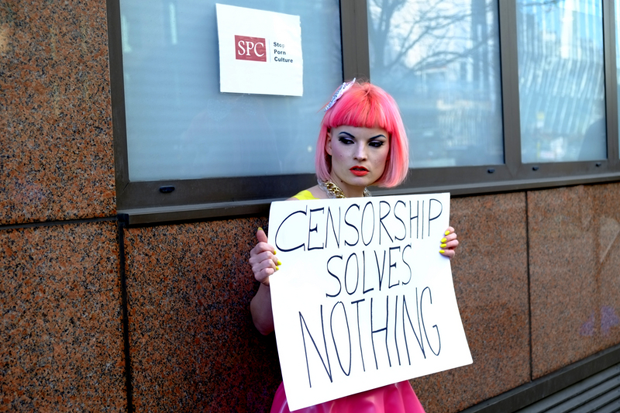11 Apr 2014 | News, Politics and Society, Religion and Culture, United Kingdom, Young Writers / Artists Programme

Protesters gathered outside a Stop Porn Culture conference in March 2014 organised by Gail Dines. Protesters included porn stars, filmmakers, artists, sex workers and supporters who believe in freedom of expression. (Photo: Rachel Megawhat/Demotix)
Last year London Mayor Boris Johnson’s aide, Simon Walsh, was arrested for possession of extreme pornography: depictions of anal fisting and urethral sounding. The respected barrister’ very public prosecution tore his life apart and lost him his jobs. In just 90 minutes the jury threw out his case – Walsh’s images were safe and legally produced.
The law under which he was prosecuted (Criminal Justice and Immigration Act 2008) was intended to affect only 30 people per year, but over 1,300 were prosecuted in 2012/13 alone. Clarification of what should be classed as “extreme”, promised by the Lords, never materialised. Government lawyers have attacked a wide range of materials, many of which juries consider innocent.
Now the government is sneaking through a vast extension to pornographic prohibition. It’s so vaguely worded that it could cover 50 Shades of Grey (if filmed), Game of Thrones or Florentine statues. Those found guilty of possession could face 3 years in prison and an unlimited fine.
Under the cloud of Cameron’s anti-child abuse crusade, possessing explicit/realistic portrayals of “the non-consensual penetration of a person’s vagina, anus or mouth by another,” real or simulated, will be illegal. The rhetoric that launched Claire Perry’s disastrous internet filtering initiative – the one that blocks abuse support, sex education and suicide helpline websites – also mandated this law. That rhetoric displays utterly muddled thinking, a confusion between stopping child abuse, stopping children accessing adult material and stopping anyone accessing non-mainstream material.
The change’s motivation is laudable. Genuine rape or abuse depictions (i.e. filming real crimes) should be illegal, all agree. Some women’s groups argue exposure to violent pornography affects viewers’ behaviour- RASASC calls the move a “step forward in preventing rapists using rape pornography to legitimise and strategise their crime”.
However, campaigners contend the draft law’s language is too ambiguous. A policy researcher from anti-censorship organisation Backlash argues: “The law will cover much more than the legislators imagine or intend.” Passing this law as an appendage in a “bumper bill (that includes) lots of legitimate concerns – a radical overhaul of probation and legal aid – (means this) very delicate matter isn’t getting appropriate democratic oversight”.
The government’s strategy, using child pornography as a blanket justification, makes effective opposition or refinement impossible. No politician spoke against the amendment in the bill’s readings or committee stage. Which MP, mindful of re-election, would stand for the right to possess violent erotica? Labour support the provision uncritically, denying it appropriate scrutiny.
Such a serious proscription, which might endanger harmless women and men, merits its own public debate, not back-door legislation. Solicitor Myles ‘ObscenityLawyer’ Jackman, who represented Walsh, highlights the dangerous subjectivity of judging pornography “realistic”, plus the “absence of any evidence proving…a causal link” between such material and Cameron’s “normalise(d) sexual violence against women”. A representative survey of 19,000 UK adults cited by three academics shows 1/3 of adult fantasies include domination or submission, and about 5% of Britons fantasise about delivering/experiencing violence. These academics’ parliamentary evidence repeated Jackman’s scepticism of the link between pornography and real-world crime. Groups like Rape Crisis South London and the End Violence Against Women Coalition assert such pornography does promote dangerous beliefs. The government itself “believes such images are unacceptable and most people would regard them as disgusting and deeply disturbing,” implying the majority’s moral distaste is grounds for legislation.
Groups like Sex & Censorship and Backlash protest the bill’s wording and justification, arguing millions of law-abiding kink practitioners might be criminalised for depicting safe, consensual, private acts. Sexual minorities including the LGBT community, bondage enthusiasts, horror-movie recreators and “vampire and goth enthusiasts who use fake blood in roleplay” could be covered, Backlash told me. Even Rackley and McGlynn, the Durham University academics who championed this law for years, criticise the bill’s wording, demanding clarification specifically banning “realistic images”, protection for “private depictions of consensual BDSM activity” and consideration of context.
Sex-positive feminism raises questions over what the bill would achieve. Arguments that violent pornography (and general sexual imagery) warps childhood development, perpetuates objectification and enables rape culture are valid, but attacking one subsection of pornography won’t stop children seeing questionable images. They fill celebrity magazines, tabloids, advertising and primetime TV.
In terms of child protection, then, this may be window-dressing. It’s far more important for schools to promote effective sex education covering consent, gender, identity and relationships, rather than a “see no evil” approach. Such education is woefully lacking and outdated. Meanwhile the government has cut funding for sexual health services for vulnerable teens and youth services, and is attacking endangered women’s panic rooms via the “bedroom tax”.
The government may be simultaneously attacking the harmless, and harming those who are helpless. The extension of extreme pornography censorship is dangerous because it’s had minimal public discussion, the wording is poorly considered, and it’s unlikely to address the problem used to promote it.
This article was published on April 11, 2014 at indexoncensorship.org
7 Feb 2014 | News, United Kingdom

Journalist Jane Fae
Feminist writer Jane Fae says she has been stopped from opening a bank account for her new project – a history of the censorship of pornography.
Fae, a contributor to Index on Censorship, had agreed with NatWest bank to set up a business account to handle the incomes and outgoings for her new self-published book, Taming the Beast.
But according to a blog post today, Fae says the bank contacted her this morning (7 February) and reneged on the agreement.
Blogging at Faeinterrupted, the journalist, who has written for outlets from the Guardian to the Daily Mail (as well as this site) reported that she had gone through all the normal procedures with the bank and signed up for a new account. She goes on:
Then, this morning, out of the blue, the call. She had since run it past her boss…her manager.
Who was less impressed. “NatWest don’t do this sort of thing”, she explained.
“Er, what sort of thing? Publishing? Academic work?”
“No: the subject matter”.
I was incredulous. “You mean that NatWest will not sanction someone writing ABOUT a particular topic? Are there any other topics you’d rather people not write about in case, you know, in case it frightens the admin staff? Perhaps we had better not write about rape, or vioilence against women or…”.
Who knows.”
Fae is waiting for a proper explanation from NatWest.
A spokeswoman for the bank told Index the issue was being investigated
Index on Censorship will keep you up to date with developments.
UPDATE 07/01/14 16:05. A NatWest spokeswoman has been in touch with Index to tell us that the business manager of the branch in Stamford, Lincolnshire is arranging to meet Jane Fae next week. The bank says “the issue is not closed”.

21 May 2013 | Europe and Central Asia
A novel published by current Irish Justice Minister Alan Shatter in 1989, has been referred to the country’s Censorship of Publications Board, according to reports.
Laura: A Novel You Will Never Forget which features a politician pressures his lover to have an abortion, is currently available on Amazon, coming with the lone user review:
this book by alan is his only novel. its about the traumas of adoption in ireland with a bit of fact based on fiction..parts of this book could be true as i was involved with a real life case similar to this book…it,s a must read and should be republished..have plenty tissues at the ready as many a tear will appear in the eye.
Shatter is currently at the heart of a political storm after he used information learned from a Garda briefing to him in his role as Justice Minister to attack a political opponent, flamboyant independent TD (member of parliament) Mick Wallace.
Speaking on a live TV debate, Shatter revealed that Wallace had escaped censure from traffic police after he was seen using his mobile phone while driving. Wallace has been campaigning against the overturning of motoring infringement penalty points for high profile and well-connected figures.
Meanwhile, Shatter’s Fine Gael party has come under attack from anti-abortion activists who believe the centre-right party is set to liberalise Ireland’s strict abortion law. Taoiseach and Fine Gael leader Enda Kenny faced protests from anti-abortion protesters during a visit to Boston yesterday.
Over 200 publications are banned in Ireland, including books on abortion and several sex manuals.
The majority of the rest of the banned titles are soft and hardcore porn magazines, including Playgirl and Scamp magazine.
Read the full list below
Register of Prohibited Publications in Republic of Ireland 2010
9 Apr 2013 | Egypt, Uncategorized
Egypt is taking steps to enforce a ban on internet porn ordered by a Cairo court late last year. The ban was first ordered three years ago, but went unimplemented. This time it looks like it’s going to happen, and it won’t be cheap: the necessary filtering system will cost the country’s government 25 million Egyptian pounds (about £2.4 million).
According to Sherif Hashem, deputy head of the National Telecom Regulatory Authority, Egypt has been installing the filters since January.
Amr Gharbeia, civil liberties director for the Egyptian Initiative for Personal Rights (EIPR) told Index that, “there is very little information on Egypt’s censorship and deep packet inspection capabilities. So far, Egypt’s non-independent National Telecom Regulation Authority (NTRA) has claimed Egypt’s telecom ecosystem does not have this kind of equipment, and that it is not in its mandate as a regulator to filter content.”
News of the ban comes at a time when the country’s Islamist leadership is facing a host of post-revolution problems: Egypt’s unemployment rate has now reached 13 per cent. In the past two years the country’s foreign reserves have gone from £23.5 billion to £8.5 billion. This past weekend saw sectarian clashes outside of a Coptic Christian cathedral in Cairo, with at least eight dead, and many injured. Unsurprisingly, President Mohamed Morsi’s approval rating has reached an all-time low.
Egypt is currently negotiating a $4.8 billion IMF loan, which requires that the country decrease subsidies and increase taxes. Last month, officials announced that subsidised bread would be rationed — a decision that sparked angry protests from bakers. While this isn’t the first time that Egypt has faced protests for increased bread prices, the move flies in the face of one of the Muslim Brotherhood’s main principles: alleviating poverty.
So with all of Egypt’s social and economic woes — why enforce a costly ban on porn now? Gharbeia told Index that the Muslim Brotherhood “is caught between a rock and a hard place, and is finding great difficulty trying to appease to the more conservative currents and the more liberal groups.”
An improved filtering system might mean that Egypt could implement bans that have previously gone unimplemented, due to technical difficulties. In February, an Egyptian court ordered that YouTube be banned for 30 days, for refusing to remove anti-Islam film, the Innocence of Muslims. The ban was eventually thrown out. Gharbeia said that while a ban on the video-sharing site is “unlikely and very costly”, “it is not impossible in the future, if socially conservative powers remain in power and continue to be the majority in parliament.” Egypt has postponed parliamentary elections to October this year.
Sara Yasin is an editorial assistant at Index. She tweets from @missyasin.



